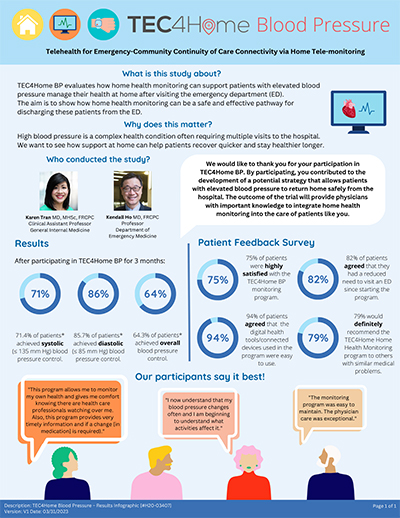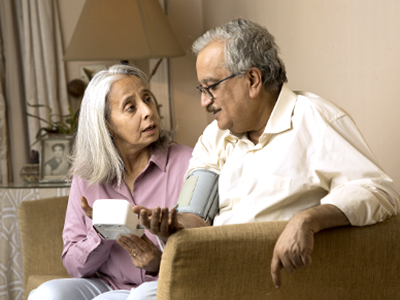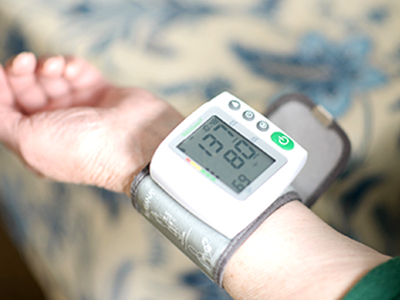
A new intervention successfully helped participants manage their blood pressure under the watchful eye of clinicians.
High blood pressure is a leading cause of morbidity and mortality around the world, and affects one in five Canadians. With rates of hypertension on the rise in B.C., research led by experts at the Vancouver Coastal Health Research Institute (VCHRI) has identified the benefits of a novel home blood pressure telemonitoring (HBPT) intervention to prevent hypertension from worsening and help people with the condition take control of their health.
“Elevated blood pressure is a silent killer,” notes Dr. Kendall Ho, co-lead of the HBPT study published in JMIR Formative Research. “The consequences of having undiagnosed elevated blood pressure are stroke, heart attack and kidney failure, among others, many of which can lead to irreversible consequences, including death.”

“Right now, people may be told in hospital that their blood pressure is high and asked to visit their family physician to follow up regarding treatment; but, the problem is that many people do not have a family physician,” Ho says. “Other patients might not understand the gravity of the situation and may decide not to pursue treatment as a result.”
Asymptomatic elevated blood pressure is a common occurrence, with many people unaware that they have the condition. The population most affected in Canada is post-menopausal women, as well as men in their 30s and 40s, says Dr. Karen Tran, an HBPT study co-lead and VCHRI researcher.
“We see more patients present to the Hypertension Clinic at Vancouver General Hospital (VGH) with uncontrolled high blood pressure now compared to 10 years ago,” Tran adds.
Researchers encourage people to monitor their blood pressure at home
Also known as the Telehealth for Emergency-Community Continuity of Care Connectivity via Home-Telemonitoring Blood Pressure (TEC4Home-BP), the HBPT pilot study forms part of a larger body of research to improve hypertension management in a convenient and accessible manner for patients.
The study team recruited 46 multi-ethnic participants discharged from the emergency department with asymptomatic elevated blood pressure. Participants had a systolic blood pressure of over or equal to 160 millimetres of mercury (mm Hg) or a diastolic blood pressure of over or equal to 100 mm Hg.

In comparison, a healthy reading for systolic blood pressure — the pressure exerted against the artery walls during a heartbeat — is less than 130 mm Hg, according to the Heart and Stroke Foundation of Canada. A low-risk reading for diastolic blood pressure — the reading when blood presses against artery walls between heartbeats — is less than 80 mm Hg.
HBPT equipped participants with wearable blood pressure telemonitoring and measurement cuffs with wireless data transfer capabilities via a Bluetooth connection. When participants used the cuffs to measure their blood pressure, data was sent wirelessly via an app on their smartphones installed with help by the research team. The Sphygmo app was used by participants to complete and share their blood pressure readings with the research team twice daily: once in the morning and evening for three months.

Participants were also assessed either in person or over the phone by the team at the Hypertension Clinic at VGH, where they received advice on how to manage their hypertension. Participants with uncontrolled elevated blood pressure were contacted by a clinician to discuss treatment or lifestyle interventions.

Researchers also noted that 76 per cent of participants were highly satisfied with the HBPT program and 76 per cent found the digital health tools incorporated in the study easy to use.
One study participant shared that the “program allows me to monitor my own health and gives me comfort knowing there are health care professionals watching over me. Also, this program provides very timely information if a change in medication is required.”
“I now understand that my blood pressure changes often and I am beginning to understand what activities affect it.”
Tran and Ho both encourage everyone to regularly measure their blood pressure at home using a validated home blood pressure cuff. For those with high readings, they recommend consulting a health professional right away and taking steps to reduce their blood pressure.
“We believe that empowering people to take control of their health, potentially with support from programs like HBPT, is one approach that can help combat the rise in uncontrolled hypertension,” says Tran, who has plans in place to conduct a multi-centre clinical trial to improve blood pressure management in an emergency context.



